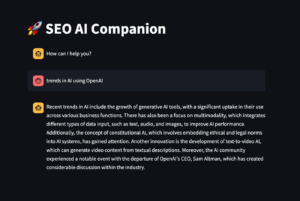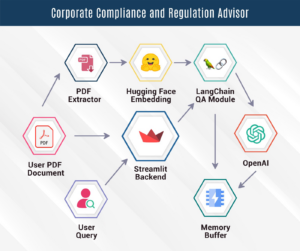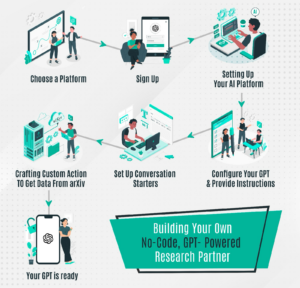AI entrepreneurship presents exciting opportunities for innovative thinkers looking to make an impact. If you’re eager to start your journey in this dynamic field, you’ve found the right resource. This guide will equip you with essential insights and strategies for launching your AI startup.
We’ll explore the essence of AI entrepreneurship, covering fundamental concepts and innovation areas that can set your business apart. You’ll learn practical steps to kickstart your venture, including an overview of crowdfunding options and the effective use of AI tools to enhance your business model. By the end of this article, you’ll have a clear roadmap for developing your AI product and crafting a robust business plan that attracts both investors and customers.
Understanding AI Entrepreneurship
AI entrepreneurship focuses on utilizing artificial intelligence to meet market demands. Entrepreneurs harness machine learning, natural language processing, and data analytics to develop innovative products and services. This approach significantly improves operational efficiencies, reduces costs, and offers advanced features that traditional businesses cannot match. Sectors like healthcare, finance, and retail have been transformed by AI, enhancing decision-making, personalizing user experiences, and automating repetitive tasks.
The proliferation of AI startups is evident, with 37% of organizations embracing AI technology, emphasizing its growing importance in the business landscape. These new ventures often generate additional revenue streams and streamline business operations.
While AI entrepreneurship brings access to groundbreaking technology and solutions for challenging problems, it also presents obstacles. Issues such as data privacy, ethical dilemmas, and the imperative to continually adapt must be navigated effectively. Success in AI entrepreneurship hinges on overcoming these hurdles amid the fast-paced evolution of technology.
Next, we will outline the steps to launch an AI startup and discuss strategic decisions that are crucial for success in AI entrepreneurship.
Steps to Launch an AI Startup
Launching a startup in AI entrepreneurship requires a focused strategy. Begin by identifying market needs where AI can make a difference. Key sectors such as healthcare, finance, and logistics are ripe for improvement, with over 50% of businesses already adopting AI technologies.
Research existing AI technologies to understand the competitive landscape. This includes analyzing current tools and their effectiveness, as well as pinpointing market gaps that your startup can address. Keeping abreast of AI trends is crucial for crafting a unique value proposition.
Next, develop a robust business model that can generate revenue through subscriptions, direct sales, or partnerships. This model should be flexible enough to adapt to the evolving AI market.
It’s also vital to build a skilled team with both technical expertise and industry knowledge. Team members with experience in AI and specific sectors can drive development and foster innovation.
Creating a Minimum Viable Product (MVP) allows for early testing of your solution’s core features. This process provides valuable user feedback, helping to refine your product and clarify market demands.
By following these steps, you can successfully navigate the initial phase of your AI startup, establishing a foundation for innovative solutions tailored to real-world problems.
Afterward, consider exploring key AI-driven innovations that can further enhance your product development and market strategy.
Key Areas of AI-Driven Innovation
Understanding the diverse applications of AI is essential for successful AI entrepreneurship. By focusing on specific niches, startups can differentiate themselves in a competitive market. One significant area is healthcare, where AI enhances patient care and boosts operational efficiency. For instance, systems like IBM Watson Health improve diagnostic accuracy and tailor treatments to individual needs. The finance sector also presents vast opportunities, as institutions increasingly integrate AI for predictive analytics and automated processes. Startups specializing in fraud detection and trading solutions can find success here. Moreover, AI’s role in automating processes across various industries optimizes supply chains and improves customer service. Entrepreneurs are encouraged to explore niche solutions in sectors like healthcare or finance, which can create value and attract investment. Finally, understanding financing options, such as crowdfunding, is vital in the journey of AI entrepreneurship.
Crowdfunding for AI Ventures
Crowdfunding is a crucial tool for AI entrepreneurship, enabling innovators to validate product demand before launch. Platforms like Kickstarter provide a valuable space for AI entrepreneurs to assess market interest and refine their offerings based on feedback. This engagement is essential for ensuring an AI solution’s relevance in the market.
Moreover, crowdfunding reduces financial risks. By raising funds upfront, entrepreneurs can develop projects without sacrificing equity or accumulating debt. This funding strategy not only secures necessary capital but also helps cultivate a loyal customer base. Notably, around 32% of successful Kickstarter projects are technology-related, presenting significant prospects for AI entrepreneurs.
Understanding how to navigate crowdfunding platforms is vital. Successful campaigns often feature compelling storytelling, engaging videos, and appealing rewards. By learning from high-performing AI projects, entrepreneurs can refine their strategies to better meet user needs.
In conclusion, crowdfunding acts as both a financial resource and a market fit assessment for AI ventures. By harnessing community support, entrepreneurs can mitigate risks and establish a robust foundation for growth. Moving forward, addressing the challenges in AI entrepreneurship will be essential for success in this complex field.
Overcoming Challenges in AI Entrepreneurship
Starting a journey in AI entrepreneurship can be daunting due to various challenges that may impact your startup’s success. High costs associated with developing algorithms, acquiring processing power, and establishing data infrastructure can quickly drain resources. Many new entrepreneurs find that building a robust AI product requires a substantial upfront investment.
In addition to financial hurdles, attracting skilled talent is crucial. The demand for AI experts often exceeds the available supply, creating intense competition for top engineers and data scientists. As a result, startups may struggle to assemble strong teams, leading to delays and a decline in product quality.
Navigating regulatory and ethical considerations is equally important. Entrepreneurs must remain updated on data privacy laws and ethical standards to avoid legal issues. Ensuring that AI systems do not reinforce biases or misuse data is critical to protecting your reputation.
To thrive in AI entrepreneurship, it is vital to secure funding, recruit knowledgeable talent, and comply with relevant regulations. By implementing effective strategies, you can successfully address these challenges. Additionally, leveraging AI tools can enhance product development efficiency and improve team collaboration.
Using AI Tools for Business Innovation
In the world of ai entrepreneurship, the integration of AI tools profoundly impacts startups by streamlining operations and increasing productivity. For instance, OpenAI’s API enables rapid development of AI applications, allowing entrepreneurs to launch innovative products more swiftly than traditional methods. This agility is essential in an industry that demands quick solutions.
Moreover, AI tools enhance overall efficiency while freeing human resources for more strategic tasks. Through automation, these tools minimize time spent on repetitive activities, leading to significant cost savings and enabling a focus on core objectives. Companies that leverage AI tools often experience improved operational efficiency, clearly illustrating their positive influence on workflows.
Despite these benefits, entrepreneurs need to be mindful of the associated costs, as API subscription models can vary with usage. Careful analysis of expected returns is essential to prevent unexpected expenses that might disrupt operations. When used strategically, AI tools not only provide a competitive edge but also simplify the complexities involved in ai entrepreneurship.
Having explored how AI tools foster innovation, the next focus should be on developing a successful AI product that aligns with market demands and customer expectations.
Developing an AI Product: The Accelerator Pathway
AI entrepreneurship requires both innovative ideas and a structured approach for turning concepts into market-ready products. The AI Product Accelerator serves as a crucial framework for startups by addressing the unique challenges of AI development.
One significant advantage of this accelerator is the tailored coaching provided to entrepreneurs. They gain valuable insights into product launch strategies, market analysis, and honing user feedback. Such guidance not only helps avoid common pitfalls but also enhances the product’s appeal, making it more attractive to customers.
Networking plays a key role during the accelerator phase. Entrepreneurs have the opportunity to connect with mentors and industry experts, fostering collaboration and resource sharing. This community enriches the learning experience and speeds up development for AI-driven projects.
The accelerator promotes innovation, allowing entrepreneurs to swiftly explore novel solutions. By combining education, hands-on experience, and community support, participants are well-prepared to navigate the complexities of AI entrepreneurship. Once your AI product is developed, crafting a detailed business plan becomes essential. This document outlines your strategy, market insights, and revenue model, which are crucial in showcasing your venture’s potential to investors.
Crafting a Business Plan for AI Products
After developing your AI product, the next crucial step in AI entrepreneurship is creating a strong business plan. This plan should outline how your product will compete in the market. Begin with comprehensive market research to understand current trends and identify key competitors. With around 37% of organizations utilizing AI, it is essential to pinpoint market gaps that your solution can address.
Next, clearly define your product’s strategy, emphasizing your unique value proposition. Specify the AI technologies, such as machine learning or natural language processing, that you will use to deliver real-world solutions. Customer engagement should also be a priority; establishing feedback loops helps you refine your product based on user insights. AI startups that focus on user experience typically achieve a 70% higher retention rate, demonstrating that engagement fosters loyalty and trust in your brand.
In summary, having a solid business plan is vital in AI entrepreneurship. By conducting thorough research, developing a clear strategy, and engaging with customers, you can position your venture for success in the rapidly evolving AI landscape.
Conclusion
This guide on AI entrepreneurship outlines essential steps for launching a successful AI startup. You are now equipped with insights to identify opportunities and tackle challenges in this dynamic field.
We emphasized the importance of creating a solid business plan tailored for AI products and considering crowdfunding as a means of securing financial support. Leveraging AI tools for innovation and pursuing a structured accelerator program can significantly enhance your visibility in this expanding market.
Now is the time to take action. Implement these strategies, define your goals, and harness the power of AI to transform your entrepreneurial aspirations into reality. The journey in AI entrepreneurship is rich with opportunity—embrace it and let your enthusiasm for AI propel you forward!
About AI Product Accelerator
AI Product Accelerator offers a structured 12-week program designed to help aspiring and experienced AI entrepreneurs build and launch valuable AI products.
This program is essential for anyone looking to transform their AI concepts into viable business solutions—become part of a supportive community that provides coaching and practical insights optimized for success.
Ready to turn your AI dreams into reality? Join us now at AI Product Accelerator!




